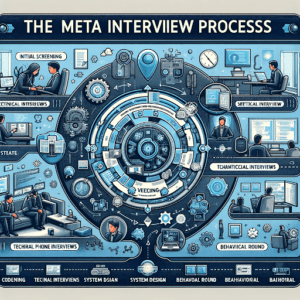Embarking on the journey for a Software Engineer (SWE) role at Meta, previously Facebook, presents a thrilling yet challenging experience. As a prominent player in the tech industry, Meta upholds stringent criteria for its technical positions, searching for candidates who excel not only in coding but also exhibit a profound grasp of software engineering concepts. This detailed guide aims to equip you for the technical screening interview at Meta, offering insights into their interview procedure and preparing you for the variety of questions you may face during the process.
Understanding the Meta Interview Process in Brief

Initial Screening:
Method: Typically via a recruiter phone call.
Focus: Assessment of your background, experience, and reasons for applying to Meta.
Phone Interviews:
What Happens Next: Post-screening, you may face one or two technical phone interviews.
Content: These involve real-time coding challenges, often on a collaborative coding platform.
Onsite Interviews:
Advancement Criteria: Clearing the phone interviews.
Structure: Multiple rounds, including:
- Coding Interviews: Testing your coding skills and technical knowledge.
- System Design Interviews: Assessing your ability to design scalable and efficient systems.
- Behavioral Sessions: Evaluating your problem-solving approach, teamwork skills, and cultural fit within Meta.
Nature: Rigorous, with a comprehensive assessment of both technical and soft skills.
Preparing for Meta Coding Interviews
1. Enhance Your Coding Skills
- Choose Your Language: Proficiency in a language like Python, Java, or C++ is key. Each has its strengths, so pick one that you’re most comfortable with.
- Understand the Fundamentals: Dive deep into the syntax, libraries, and idiosyncrasies of your chosen language. This knowledge is foundational for tackling more complex problems.
- Efficient Coding Practices: Focus on writing clean, efficient code. Pay attention to how you use data structures and algorithms in your solutions.
2. Master Data Structures and Algorithms
- Data Structures: Be well-versed in arrays, linked lists, trees, and graphs. Knowing when and how to use these structures is critical for solving complex problems.
- Algorithm Knowledge: Sorting, searching, recursion, and dynamic programming are essential algorithms you should be comfortable with.
- Complexity Analysis: Understand the time and space complexity of your solutions. This skill is crucial for optimizing code and making it scalable.
3. Regular Practice with Coding Challenges
- Use Online Platforms: Platforms like LeetCode, HackerRank, or CodeSignal offer a plethora of problems that mimic interview scenarios. Regular practice on these platforms can be highly beneficial.
- Simulate Interview Conditions: While practicing, time yourself. This helps in managing time during the actual interview.
- Think Aloud: Articulate your thought process while solving problems. This practice will help you communicate effectively during the interview.
4. Additional Tips
- Review Previous Solutions: Regularly revisit problems you found challenging. This reinforces concepts and helps identify areas for improvement.
- Peer Discussions and Mock Interviews: Engage in discussions with peers or mentors and participate in mock interviews. They provide valuable feedback and simulate a real interview atmosphere.
- Stay Updated: The tech world evolves rapidly. Keep abreast of new trends and advancements in programming and software development.
Meta Interview Questions – Key Areas to Expect
Technical Coding Questions
Nature of Questions: Focus on solving algorithmic challenges.
Examples:
- Optimizing code for better performance.
- Implementing specific functions or algorithms.
- Debugging and correcting faulty code segments.
Key Skills Tested:
- Proficiency in preferred programming languages.
- Understanding and application of data structures and algorithms.
- Analytical thinking and problem-solving capabilities.
System Design Questions:
- Target Candidates: More prevalent for experienced candidates.
- Question Format: Designing scalable and efficient systems.
Examples may include developing a messaging app or a social network feed.
Skills Evaluated:
- Knowledge of software architecture principles.
- Familiarity with database management and data modeling.
- Ability to address scalability, reliability, and security in system design.
Behavioral Questions:
Purpose: To assess cultural fit and soft skills.
Common Topics:
- Discussing past professional experiences.
- Demonstrating ability in teamwork and collaboration.
- Handling conflict resolution and challenging situations.
- Illustrating problem-solving approaches in real-world scenarios.
Preparation Tips:
- Research and understand Meta’s core values and mission.
- Reflect on past experiences that highlight relevant skills and attitudes.
- Practice articulating thoughts and experiences clearly and concisely.
Additional Tips for Meta Interviews:
Technical Preparation: Regular practice with coding challenges and algorithm problems.
System Design: Brush up on basic and advanced concepts of system architecture.
Behavioral Aspects: Prepare with examples from your professional journey that align with Meta’s values.
Communication: During the interview, articulate your thought process and reasoning clearly.
Cultural Fit: Show your alignment with Meta’s ethos and how you can contribute to their team and goals.
Interview Day Tips for Meta SWE Interviews

1. Stay Calm and Positive:
- Understand that interviews can be stressful.
- Maintain calmness to think clearly.
- Don’t hesitate to ask for hints if stuck.
2. Communicate Clearly:
- Articulate your thought process while solving problems.
- Helps interviewers understand your approach.
- Perfect solutions are less important than clear communication.
3. Ask Questions:
- If a problem is unclear, ask clarifying questions.
- Shows engagement and desire to get things right.
- Ensures you’re solving the correct problem.
4. Think Aloud:
- Vocalize your thought process during coding.
- Allows interviewers to follow and guide your approach.
- Useful for staying on track and getting subtle guidance.
Post-Interview Actions
5. Reflect on Your Performance:
- Post-interview, evaluate what went well and what didn’t.
- Reflecting is crucial for learning and future interview improvements.
6. Follow Up:
- Send a thank-you email to your interviewers.
- It’s a courteous gesture and keeps you memorable.
- Shows professionalism and appreciation.
7. Be Patient:
- Meta’s review process may take weeks.
- Utilize this time to enhance your skills.
- Prepare for other potential opportunities.
Read more about :
Technical Skills Assessment Tips for Employers
Mitigating Bias in the Hiring Process through Skills Assessments
Unlocking the Secret: Creating Technical Tests That Keep Applicants Interested
Conclusion
Navigating the Meta interview process for a Software Engineering role presents both challenges and rewards. Essential preparation includes honing coding skills, understanding data structures, mastering algorithms, grasping system design concepts, and preparing for behavioral questions. Effective communication, maintaining composure, and authenticity are crucial throughout this process. Whether successful or not, participating in Meta’s interview process is a significant and enriching milestone in your journey as a software engineer.



